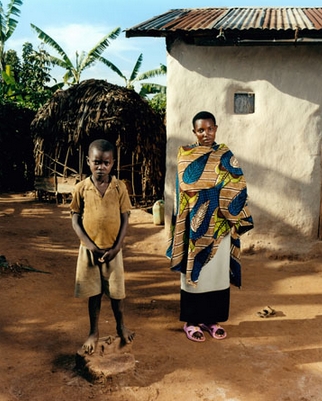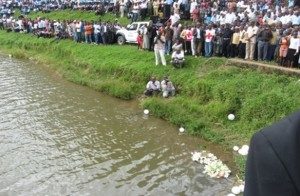
Lindsey Hilsum in today’s Observer writes of the extraordinary testimony of women who were raped during the genocide in Rwanda twenty years ago – and of the children born as a result. Survivors Fund (SURF), with our US partner, Foundation Rwanda, have been supporting this population since 2009 – work which we highlight below.
There is still a critical need to extend that work ahead and you can support it by donating now to the work of Survivors Fund (SURF) by clicking on the banner below:
If you are in the US, then you can donate to Foundation Rwanda by clicking on the banner below:
Thank you.
Survivors Fund / Foundation Rwanda Update on the Programme to Support Children Born of Rape in Rwanda (as of June 2014)
In the 1994 Genocide against the Tutsi in Rwanda, and for several years after, hundreds of thousands of Rwandan women and girls were brutally raped. Of these, an estimated 20,000 gave birth. Many were infected with HIV/AIDS. With loved ones lost in the genocide and rape a social taboo, the women and girls were alone in their shame. The children were constant reminders of the violence and pain their mothers experienced. These women and children have been severely marginalized by their families and communities. Their plight is documented in this remarkable film here.
In 2009, Survivors Fund (SURF) partnered with the US 501(c)3 nonprofit organization, Foundation Rwanda, to support this population. Foundation Rwanda has raised nearly $1 million towards a programme to secure an education for children born of rape, which Survivors Fund (SURF) manages and monitors with our partner organisations in Rwanda.
The work includes a principal focus on channeling the maximum possible funding towards the education of children born of rape, then providing secondary (but no less vital) support to the mothers of the children – whilst continuing to raise awareness of the plight of this vulnerable and marginalized group, in order to generate additional funding to extend the reach of the program.
- Education
As of 2014, of the 735 students currently receiving support from Survivors Fund and Foundation Rwanda:
– 13 students are in the final two years of primary school
– 313 students are in lower secondary school (Years 1 to 3)
– 259 students are in upper secondary school (Years 4 to 6)
– 150 students are at vocational college
From the initial cohort that began receiving educational support from 2009:
– 39 students have graduated from secondary school
– 1 of which has received funding to start university
217 students have received bicycles through the Foundation Rwanda bike build program, with a further 100 bikes to be built in July by volunteers on the third bike build. We hope to build a further 300 bikes by the end of 2015 to ensure then that every student still enrolled in the program will have access to transport to school – saving on average two hours of travelling time a day for each student that has a bike.
To date 20 students have dropped out of school, ten girls over the past two years as a result of pregnancy. This has reinforced the importance of sex education for the students which is an integral component of the bike build program.
A further 5 students have been helped to return to school after dropping out due to chronic eye and teeth problems who were supported to receive treatment.
- Psychological and medical support services and income-generating activities
40 women have received structured counselling support through a pioneering Community Counselling Initiative, a 26 week psychosocial support program developed by the Survivors Fund and Foundation Rwanda team to improve the mental health of mothers on the program, and empower them to build stronger relationships with their children. The women reported that the intervention had transformed their lives, on average reporting their quality of life increased from a score of 3/10 to a score of 9/10. At the beginning of the sessions, nearly half the women reported having no one to talk to and by the end all of the women felt they had at least one person to talk to, with the majority reporting that they had “many people to talk to”. Over half the women reported increased acceptance of their children, and nearly half noticed an improved relationship with their child. The children also noticed positive changes with their mothers and at home. The women have reported that they have been able to share their experience of counselling with others in their community, providing counselling support to an additional 210 members of their community.
A further 260 women are now participating in a scale up of the Community Counselling Initiative this year.
220 women and their children have been screened for oral cancer and received oral health treatment through a unique partnership between Foundation Rwanda and GLO/Good. In a separate initiative 12 women received treatment for gynecological problems resulting from rape during the genocide, 2 of which received corrective surgery for fistula.
A pilot group of 20 women have been trained and supported to establish themselves into a cooperative which is now producing handicrafts and textile goods for the export market, in a project with Indego Africa and Survivors Fund (SURF). The Ladies of Abasangiye, which the cooperative is named, received an education in English, business and sewing enabling them to now be self-sufficient and financially independent.
- Awareness-raising
Over 200 mothers of children on the program have signed a letter urging the Government of Rwanda to honor its commitment to provide greater support to the population. The petition is due to be submitted in May 2014, and will call on the Ministry of Local Government (MINALOC) to extend access to vocational training to their children, and for the Government Fund for Vulnerable Genocide Survivors (FARG) to provide access to microfinance training to the mothers so that they can develop the skills and access the resources to establish sustainable livelihoods to care independently for themselves and their children.
Survivors Fund and Foundation Rwanda are now seeking to raise $1,104,227 to conclude the work over the next five years by providing the psychological, medical and livelihood development support still required by the mothers on the program and to ensure that all the 735 students receive the support they still require to all graduate from school by 2019.



